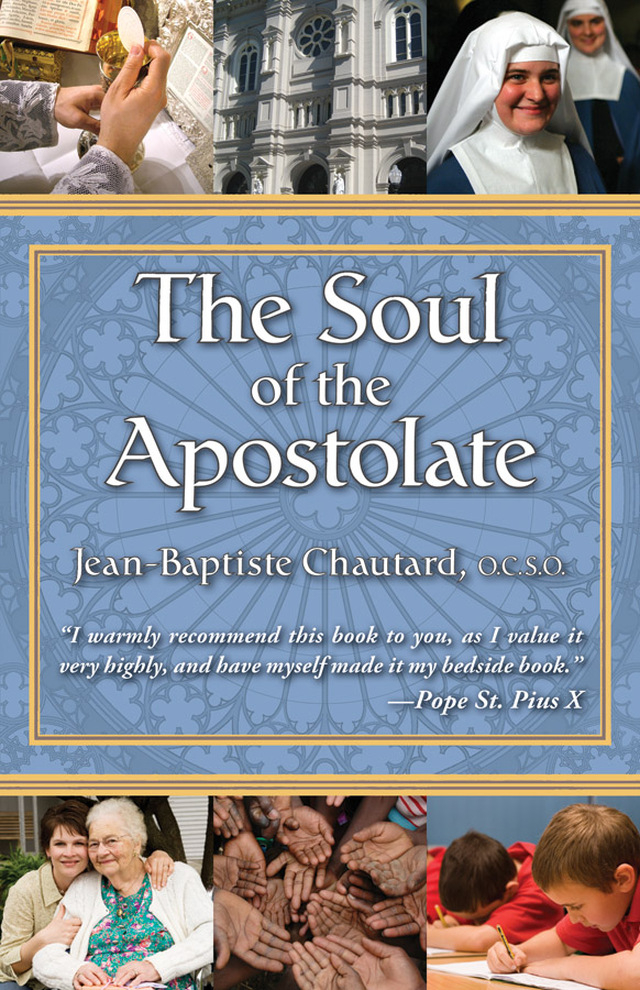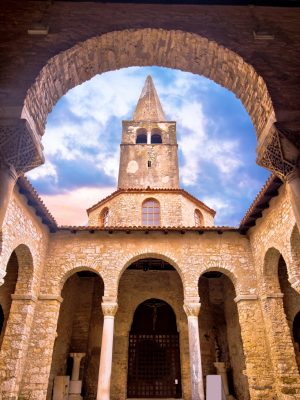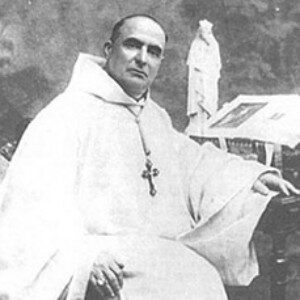In this book the words life of prayer, contemplative life will be applied, as they are in the Imitation of Christ to the state of those souls who have dedicated themselves to a Christian life which is at the same time out of the common, and accessible to all, and, in substance, obligatory for all.
Without embarking upon a study of asceticism, let us at least remind the reader that EVERYONE is obliged to accept the following principles as absolutely certain, and base his inner life upon them.
FIRST TRUTH:
Supernatural life is the life of Jesus Christ Himself in my soul, by Faith, Hope, and Charity; for Jesus is the meritorious, exemplary, and final cause of sanctifying grace, and, as Word, with the Father and the Holy Ghost, He is its efficient cause in our souls. The presence of Our Lord by this supernatural life is not the real presence proper to Holy Communion, but a presence of vital action like that of the action of the head or heart upon the members of the body. This action lies deep within us, and God ordinarily hides it from the soul in order to increase the merit of our faith. And so, as a rule, my natural faculties have no feeling of this action going on within me, which, however, I am formally obliged to believe by faith. This action is divine, yet it does not interfere with my free will, and makes use of all secondary causes, events, persons, and things, to teach me the will of God and to offer me an opportunity of acquiring or increasing my share in the divine life.
This life, begun in Baptism by the state of grace, perfected at Confirmation, recovered by Penance and enriched by the Holy Eucharist, is my Christian life.
SECOND TRUTH:
By this life, Jesus Christ imparts to me His Spirit. In this way, He becomes the principle of a superior activity which raises me up, provided I do not obstruct it, to think, judge, love, will, suffer, labor with Him, by Him, in Him, and like Him. My outward acts become the manifestations of this life of Jesus in me. And thus I tend to realize the ideal of the INTERIOR LIFE that was formulated by St. Paul when he said: “I live, now not I, but Christ liveth in me.”
Christian life, piety, interior life, sanctity: in all these we find no essential difference. They are only different degrees of one and the same love. They are the half-light, the dawning, the rising, and the zenith of the same sun. Whenever the expression “interior life” is used in this book, the reference is not so much to habitual interior life, which we may call the “principal” or “capital” of the divine life deposited in us, by sanctifying grace, as to the actual interior life, which invests this capital and puts it to work in the activity of our soul, and in our fidelity to actual graces.
Thus I can define it as the state of activity of a soul which strives against its natural inclinations in order to REGULATE them, and endeavors to acquire the HABIT of judging and directing its movements IN ALL THINGS according to the light of the Gospel and the example of Our Lord.
Hence: a twofold movement. By the first, the soul withdraws from all that is opposed to the supernatural life in created things, and seeks at all times to be recollected: aversio a creaturis. By the second, the soul tends upwards to God, and unites itself with Him: conversio ad Deum. The soul wishes in this way to be faithful to the grace which Our Lord offers to it at every moment. In a word, it lives, united to Jesus, and carries out in actuality the principle: He that liveth in Me, and I in him, the same beareth much fruit.
THIRD TRUTH:
I would be depriving myself of one of the most effective means of acquiring this interior life if I failed to strive after a precise and certain faith in the active presence of Jesus within me, and if I did not try to make this presence within me, not merely a living, but an extremely vital reality, and one which penetrated more and more into all the life of my faculties. When Jesus, in this manner, becomes my light, my ideal, my counsel, my support, my refuge, my strength, my healer, my consolation, my joy, my love, in a word, my life, I shall acquire all the virtues. Then alone will I be able to utter, with sincerity, the wonderful prayer of St. Bonaventure which the Church gives me for my thanksgiving after Mass: Transfige dulcissime Domine Jesu.
FOURTH TRUTH:
In proportion to the intensity of my love for God, my supernatural life may increase at every moment by a new infusion of the grace of the active presence of Jesus in me; an infusion produced:
1. By each meritorious act (virtue, work, suffering under all its varying forms, such as privation of creatures, physical or moral pain, humiliation, self-denial; prayer, Mass, acts of devotion to Our Lady, etc.).
2. By the Sacraments especially the Eucharist. It is certain, then (and here is a consequence that overwhelms me with its sublimity and its depth, but above all, fills me with courage and with joy), it is certain that, by every event, person or thing, Thou, Jesus, Thou Thyself, dost present Thyself, objectively, to me, at every instant of the day. Thou dost hide Thy wisdom and Thy love beneath these appearances and dost request my co-operation to increase Thy life in myself.
O my soul, at every instant Jesus presents Himself to you by the GRACE OF THE PRESENT MOMENT—every time there is a prayer to say, a Mass to celebrate or to hear, reading to be done, or acts of patience, of zeal, of renunciation, of struggle, confidence, or love to be produced. Would you dare look the other way, or try to avoid His gaze?
FIFTH TRUTH:
The triple concupiscence caused by original sin and increased by every one of my actual sins establishes elements of death that militate against the life of Jesus in me. Now in exact proportion as these elements develop in me, they diminish the exercise of that life. Alas! They may even go so far as to destroy it outright. Nevertheless, inclinations and feelings contrary to that life, and temptations, even violent and prolonged can do it no harm whatever as long as my will resists them. And then (what a consoling truth!) like any other elements in the spiritual combat, they serve only to augment that life, in proportion to my own zeal.
SIXTH TRUTH:
If I am not faithful in the use of certain means, my intelligence will become blind and my will too weak to co-operate with Jesus in the increase, or even in the maintenance of His life in me. And the result will be a progressive diminution of that life: I shall find myself slipping into tepidity of the will. Through dissipation, cowardice, self-delusion, or blindness, I tend to compromise with venial sin. But therefore my whole salvation is in danger, since I am paving the way to mortal sin.
Were I to have the misfortune to fall into this tepidity (and a fortiori if I were to go lower still), I would have to make every effort to get out of it.
1) I would have to revive the fear of God in my soul by imagining myself, as vividly as possible, face to face with my last end, with death, with the judgment of God, with hell, eternity, sin, and so forth.
2) And to revive compunction by the sweet science of Thy wounds, O my merciful Redeemer. Going, in spirit, to Calvary, I would throw myself down at Thy holy feet and let Thy living Blood run down upon my head and heart to wash away my blindness, melt the ice in my soul, and drive away the torpor of my will.
SEVENTH TRUTH:
I must seriously fear that I do not have the degree of interior life that Jesus demands of me:
1. If I cease to increase my thirst to live in Jesus, that thirst which gives me both the desire to please God in all things, and the fear of displeasing Him in any way whatever. But I necessarily cease to increase this thirst if I no longer make use of the means for doing so: morning mental-prayer, Mass, Sacraments, and Office, general and particular examinations of conscience, and spiritual reading; or if, while not altogether abandoning them, I draw no profit from them, through my own fault.
2. If I do not have that minimum of recollection which will allow me, during my work, to watch over my heart and keep it pure and generous enough not to silence the voice of Our Lord when He warns me of the elements of death, as soon as they show themselves, and urges me to fight them. Now I cannot possibly retain this minimum if I make no use of the means that will secure it: liturgical life, aspirations, especially in the form of supplication, spiritual communion, practice of the presence of God, and so on.
Without this, my life will soon be crawling with venial sins, perhaps without my being aware of it, self-delusion will throw up the smoke screen of a seeming piety that is more speculative than practical, or of my ambition for good works, to hide this state from me, or even to conceal a condition more appalling still! And yet my blindness will be imputed to me as sin since, by failing to foster the recollection indispensable to it, I shall have fomented and encouraged its very cause.
To be continued…
This article is taken from a chapter in The Soul of the Apostolate by Jean-Baptiste Chautard which is available from TAN Books.









